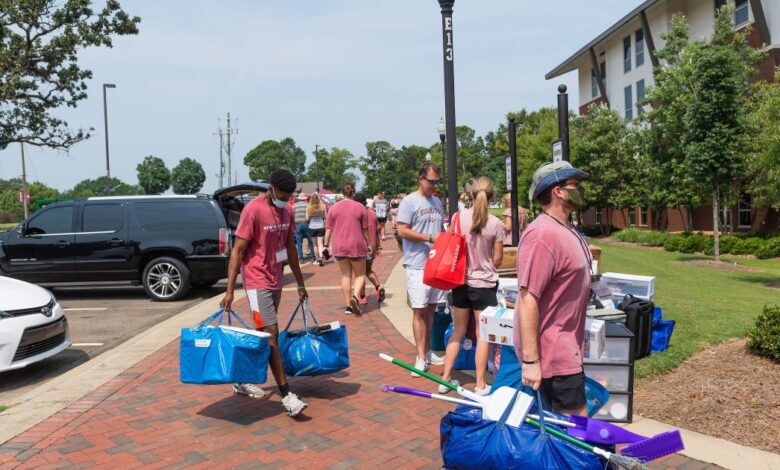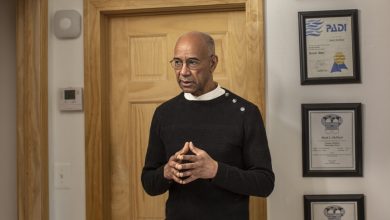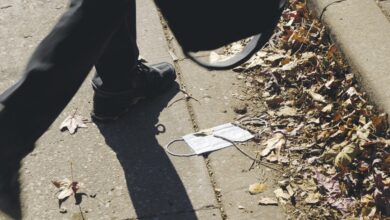Some Universities Have Less Space to Isolate Students This Fall. Is That a Problem?

Despite rising numbers of Covid-19 cases, many college campuses expect to be back at full capacity this fall. So do hotels.
That’s left some institutions without the robust quarantine and isolation housing that had been critical to their reopening plans in 2020.
The more-transmissible Delta variant of the coronavirus is spreading rapidly, once again raising the possibility that infected or exposed students might need to isolate — a difficult task in communal housing like dorms.
Mississippi State and Texas Tech Universities are among those warning students that they could be on their own finding quarantine housing. Both are in states with high numbers of cases of Covid-19, according to data collected by The New York Times.
“Limited isolation and quarantine space is available,” said Regina Hyatt, vice president for student affairs at Mississippi State. “For students who have to isolate or quarantine, we’re asking them to have a plan.” The university used hotels to isolate students last year, but this year, hotels are booked.
At Texas Tech, students will not be provided with a location to self-isolate, the Daily Toreador reported. The university will also not cover any expenses associated with isolation.
Last year, many colleges that operated in person did so with fewer students on campus, leaving them with otherwise-empty dorm space to isolate students when they were exposed to Covid-19 or developed symptoms.
This year, a limited supply of isolation rooms might not be a problem in areas where vaccination rates are high and mask-wearing is common, said Crystal R. Watson, an assistant professor in the department of environmental health and engineering at the Johns Hopkins University. She’s more worried about it in areas where those public-health efforts are less common.
“I don’t think there’s the same level of need for isolation spaces, proportionally to last year,” she said. “It still may overwhelm some campuses, especially in places that decide not to implement indoor masking.”
Watson said she is worried about the possibility that students who get infected will go home to quarantine. The American College Health Association discouraged campuses from sending students home to isolate or quarantine because students could spread the virus during transit. Though the Covid-19 vaccines have been effective at keeping young people out of the hospital, they can still get infected and spread the disease to their family members.
“What we’re also seeing with Delta is that older people may be more likely to be hospitalized even if they’ve been vaccinated,” Watson said. “I do worry about sending people home.”
Edwin Michael, an epidemiologist at the University of South Florida, said the situation is far less worrisome than it was last year. Most students coming back to campus this fall will have some immunity, whether it’s through the vaccine or because they’ve already been infected.
“The landscape has definitely changed with the vaccine,” he said. Compared to last year, administrators “feel they can manage this better,” he said.
In some states, including Texas and Florida, bans on mask and vaccine mandates may limit colleges’ ability to hamper the spread of the virus on their campuses.
In Arizona, there is also a law against mandatory Covid-19 testing. Kristen M. Pogreba Brown, an assistant professor of public health at the University of Arizona who is helping with the university’s plans to reopen, said there were fewer isolation spaces available compared to last year. The institution still has one dorm of about 150 beds available for isolation, she said. Under normal circumstances, nearly 8,000 students live on campus, according to the university’s website.
“Two months ago when we were planning for the fall semester, we were still hopeful that we would be able to get a vaccine mandate,” she said. That would lower the risk of the spread of the virus, which could reduce the need for isolation space.
But Pogreba Brown said that the more-limited space for isolation isn’t one of her biggest concerns.
“There’s bigger issues,” she said. “It’s not that this isn’t one. It’s not an unsolvable problem.”
Students might be asked to isolate in place, she said. If they have roommates, the roommates might have to isolate, too.
The bottom line, Pogreba Brown said, is that she hopes students get vaccinated. “It really is our best chance of reducing the spread of Covid on campus.”
Source link






